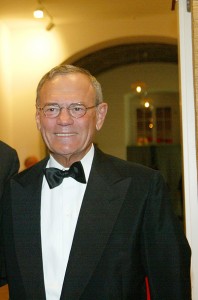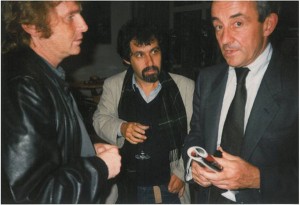On Why the Death of Stuart Hall Is a Loss for our Academy Programs
Stuart Hall, the renowned British cultural theorist and sociologist, passed away exactly one month ago, on 10 February 2014. His death prompted in us a deep sense of personal loss. His groundbreaking writings on cultural studies, in particular on racial inequality, were first translated into German in the mid 1990s—a time when people here were beginning to acknowledge the importance of racism as an issue.

Silent vigil of the Jewish Community at the Putlitz Bridge Deportation Memorial
Photo: Michael Kerstgens, Berlin Tiergarten, 1992
Hall’s approach incited a new discussion and coined a new vocabulary: until then, Germans in the Federal Republic had spoken of “Fremdenfeindlichkeit” (xenophobia), which they regarded as a marginal social phenomenon. Politicians and the media spoke matter-of-factly of society “reaching breaking point” when “the boat gets too full” owing to “Überfremdung.” The latter term denotes the state of ‘being overrun by foreigners.’ It is itself deeply racist and was accordingly voted Non-word of the Year 1993. “Being overrun” was presumed however to be explanation enough for the fire-bombings and other attacks then being carried out almost daily on asylum-seekers’ accommodation centers or immigrants’ apartments—and likewise for the hate campaigns, man-hunts, and pogrom-type riots erupting in Rostock, Hoyerswerda, and elsewhere, or the emergence of no-go areas in other towns and rural centers. In consequence, the law on asylum was altered in 1993 such that judicial opinion held it to have been “de facto repealed.” Therefore, anyone who wished to address the issue of racism as a structural phenomenon and thereby draw on theoretically sound academic sources had necessarily to turn to authors from England, France, the USA, or Canada—and repeatedly to Stuart Hall. → continue reading

Rafael Roth, 2003 © Jewish Museum Berlin, photograph: Bildschön
In late 1998, long before the Jewish Museum Berlin opened its doors, the Berlin entrepreneur Rafael Roth offered to support the museum financially. He was committed to W. Michael Blumenthal’s vision of a center dedicated to research on and education in the history of Jewish life in Germany.
Roth was enthusiastic about the idea of a modern media center that would enable visitors to explore Jewish history in an interactive format. His generous donation funded the architecture, the concept and the technical development of this center, located on the subterranean level of the Daniel Libeskind building. When the “Rafael Roth Learning Center“ was inaugurated together with the permanent exhibition on 9 September 2001, it fulfilled its initial purpose, namely to be “the most up-to-date, most impressive and most important center of its kind.” Twelve years later, the media-lounge and study rooms still attract a great number of museum visitors.
Rafael Roth died on 21 September. The Jewish Museum Berlin is highly indebted to him and remembers him in great fondness.
Mirjam Wenzel and Henriette Kolb, Media
10 April, 1946 – 9 August, 2012

Ronny Loewy (in the middle) with the director Louis Malle (r.) and Daniel Cohn-Bendit (l.) at the German premiere of “Au revoir les enfants,” 1987, courtesy of Gisela Geier-Loewy
On August 9 of last year, film historian Ronny Loewy died. He was a remarkable person and a friend of this museum, who supported and inspired our work from the beginning: it was Ronny who selected many of the film excerpts that appear in our permanent exhibition or appeared in the special exhibition “Home and Exile”. He also published, among other things, Tereska Torrès’s film diary Unerschrocken: Auf dem Weg nach Palästina (Unafraid: On the Way to Palestine) about the illegal emigration of Displaced Persons to Palestine in 1947 and 48. Ronny was a colleague and friend, with whom we not only worked but also shared many experiences and much laughter, who constantly opened our eyes to the new and unusual, the forgotten and overlooked, little details from films, and above all to the people behind these moving pictures.
We therefore wish to dedicate space on this blog today to remembering him and his life, one year after his death: → continue reading


